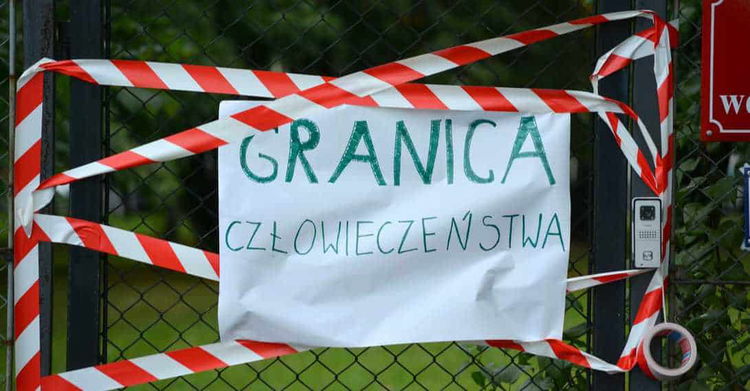Weronika Grzebalska argues that Lukashenka’s thrashing around in eastern Europe forces progressives to offer a positive alternative on security.

All is not quiet on the eastern front. This summer, the European Union’s external border has been put to the test by a wave of irregular migration, directed at Lithuania, Latvia and Poland by the regime of AlyaksandrLukashenka in Belarus. In this moment of crisis, dangerous emergency measures are being implemented by governments in the name of security.
Those to the left of the political centre try to win the hearts and minds of the public by shifting attention from hybrid threats to fundamental rights and humanitarian considerations. Yet by downplaying national security, they virtuously retreat into the political backseat. Is central- and eastern Europe fated to right-wing securitisation—or is a positive, left-wing national-security agenda possible in the region?
Act of retaliation
The weaponisation of migration by Belarus came as an act of retaliation for EU sanctions imposed on the regime after its hijacking of a Ryanair plane to arrest an opposition journalist. In May, Lukashenka vowed to allow drugs and illegal migrants to flow into the EU. In what followed, Lithuania recorded over 4,000 newcomers this year, compared with just 81 in 2020. Belarusian state-owned tourist companies have made money co-ordinating the migrant flow, with Lukashenka’s security officers filmed pushing people through the EU border.
While state-organised migration is a new challenge for the region, there is nothing novel about Lukashenka’s hybrid activities or those emanating from the Kremlin. From cyber-attacks on essential Estonian institutions, through the annexation of Crimea, all the way to disinformation campaigns smearing Poland and Lithuania for supporting Belarusian dissidents fleeing violent crackdowns, this is an emergent hotspot on the EU’s periphery.
Given this geopolitical context, it is not surprising that Baltic and Polish political leaders narrate the crisis predominantly through the lens of (inter)national security—as an act of ‘hybrid warfare’ on the EU’s border, aiming to wreak domestic and international instability. Those in power rightfully underscore the responsibility of the state to ensure the safety of its citizens. Their security bias makes them however more prone to sacrifice democratic standards in the process.
All three states swiftly reinforced border protection—a razor-wire fence being one dramatised element—and enacted controversial, extra-legal emergency measures. These measures have restricted journalists’ access to the border, leading to a de facto state monopoly on information. All three states have also seen a temporary legalisation of migrant pushbacks, as well as stark restrictions on the rights of asylum-seekers. In Latvia and Poland, border standoffs with Belarusian forces left dozens of people trapped at the border for weeks.
In its own way, the crisis has confronted eastern Europe with a larger, pan-European dilemma—how can democratic states defend themselves while marrying security with fundamental rights? Across Europe, the answer tends to increasingly tilt towards security, with the EU’s migration and border policy significantly hardening since the 2015 ‘refugee crisis’.
Humanitarian concerns
Much as across the rest of the EU, rights-based non-governmental organisations in Poland and the Baltics tried to balance this securitising drift by shifting public attention to humanitarian concerns and the restrictions on civil liberties. They publicised personal stories of migrants, appealed to public emotions and sounded the alarm about breaches of fundamental rights.
In the Baltics, these critical voices inform public and parliamentary debates yet do not undermine the otherwise strong political consensus on national security embodied in the doctrine of ‘total defence’. Poland stands in stark contrast, with the border crisis falling hostage to political polarisation between the illiberal right and the absolutist left.
Nowhere has this dead-end polarisation been more visible than in the border territory near Usnarz Górny, where around 30 people are trapped in a standoff between Belarusian and Polish border guards, unable to enter EU territory or to withdraw into Belarus. The illiberal government has enjoyed seizing this crisis moment—playing hardline defenders while deliberately not incorporating other political and civil-society actors in their crisis response. The opposition has played along, assuming the role of righteous critic of any and all government actions.
To be sure, NGOs’ support for the migrants in their plight has been laudable and the watchdog activity of compassionate journalists invaluable. The left is in the right in arguing that Poland, as with many EU frontline states today, breaks international legal standards, embodied in the Geneva convention, through pushbacks and restricted asylum procedures. They are an important voice of moral conviction defending people instrumentalised by a rogue leader and left vulnerable by EU border-security measures.
Carefully weighed
Still, there is a significant tradeoff. The more the left stands as the virtuous few against the morally corrupt majority, the less capable it is of seeing that the country faces real security challenges which need to be carefully weighed when designing a response.
As polarisation intensified, one progressive Polish MP attempted to run through the border to reach migrants, disregarding possible repercussions from Belarus. Opposition figures followed suit, calling the uniformed services a ‘pack of dogs’ and framing the Polish response as a larger threat than Lukashenka. Finally, paying homage to the idea of open borders, a group of activists began destroying the border fence at night—an act which did not go unnoticed in pro-Kremlin media.
The more radical those on the left became in their responses, the less they seemed to get things right for those they wished to protect. In a recent poll, almost 65 per cent of Poles held a negative view of how the opposition handled the border crisis and 85 per cent criticised the activists’ attempt to destroy the border fence. Defending fundamental rights while refusing to engage in a serious debate on how to protect the country only gets the left so far. To assert its principles effectively, the left needs its own positive stance on national security.
Designing a left-wing national-security agenda seems futile, given the field is dominated by the right. Yet without the left rising to this challenge, we cannot hope for a national-security policy balanced by fundamental rights. So what could such an agenda for eastern Europe look like?
First, any programme should start by acknowledging the region faces real security challenges and that some stem from the hybrid activities of rogue foreign leaders, not just the left’s usual suspects: global inequalities, neoliberalism or right-wing populism. Secondly, having a positive programme means going beyond saying what the left opposes and laying out what exactly it intends to do for our states and fellow citizens in turbulent times.
Thirdly, given the left’s principled anti-militarist stance, this positive agenda should focus on building security through non-military means. While increasing defence spending or using emergency law may sometimes be necessary, ‘hybrid interference’ operates through targeting and exploiting failing institutions, polarisation and low public trust, inequality and marginalisation. And the best line of hybrid defence turns out to be what the left has advocated all along—an effective social democracy premised on socio-economic equality, human rights and the rule of law.
Once the east-European left promotes a positive national-security programme, its principled defence of civil liberties and humanitarian standards may finally seem convincing to voters.
This is a joint publication by Social Europe and IPS-Journal
Weronika Grzebalska is a sociologist, an assistant professor at the Institute of Political Studies of the Polish Academy of Sciences and a RethinkCEE fellow at the German Marshall Fund of the US. Her work focuses on (para)militarism, security, right-wing politics and gender politics in central Europe in the neoliberal era.
